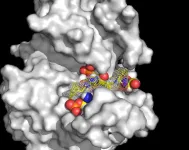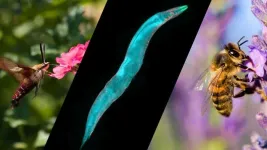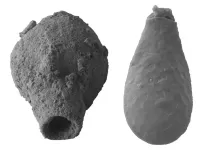(Press-News.org) Singapore, 7 October 2024—Scientists from Duke-NUS Medical School and the University of California, Santa Cruz, have discovered the secret to regulating our internal clock. They identified that this regulator sits right at the tail end of Casein Kinase 1 delta (CK1δ), a protein which acts as a pace setter for our internal biological clock or the natural 24-hour cycles that control sleep-wake patterns and other daily functions, known as circadian rhythm.
Published in the journal PNAS, their findings could pave the way for new approaches to treating disorders related to our body clock.
CK1δ regulates circadian rhythms by tagging other proteins involved in our biological clock to fine-tune the timing of these rhythms. In addition to modifying other proteins, CK1δ itself can be tagged, thereby altering its own ability to regulate the proteins involved in running the body’s internal clock.
Previous research identified two distinct versions of CK1δ, known as isoforms δ1 and δ2, which vary by just 16 building blocks or amino acids right at the end of the protein in a part called the C-terminal tail. Yet these small differences significantly impact CK1δ’s function. While it was known that when these proteins are tagged, their ability to regulate the body clock decreases, no one knew exactly how this happened.
Using advanced spectroscopy and spectrometry techniques to zoom in on the tails, the researchers found that how the proteins are tagged is determined by their distinct tail sequences.
Howard Hughes Medical Institute Investigator Professor Carrie Partch from the Department of Chemistry & Biochemistry at the University of California, Santa Cruz and corresponding author of the study explained:
“Our findings pinpoint to three specific sites on CK1δ’s tail where phosphate groups can attach, and these sites are crucial for controlling the protein’s activity. When these spots get tagged with a phosphate group, CK1δ becomes less active, which means it doesn’t influence our circadian rhythms as effectively. Using high-resolution analysis, we were able to pinpoint the exact sites involved—and that’s really exciting.”
Having first studied this protein more than 30 years ago while investigating its role in cell division, Professor David Virshup, the director of the Cancer and Stem Cell Biology Programme at Duke-NUS and co-corresponding author of the study, elaborated:
“With the technology we have available now, we were finally able to get to the bottom of a question that has gone unanswered for more than 25 years. We found that the δ1 tail interacts more extensively with the main part of the protein, leading to greater self-inhibition compared to δ2. This means that δ1 is more tightly regulated by its tail than δ2. When these sites are mutated or removed, δ1 becomes more active, which leads to changes in circadian rhythms. In contrast, δ2 does not have the same regulatory effect from its tail region.”
This discovery highlights how a small part of CK1δ can greatly influence its overall activity. This self-regulation is vital for keeping CK1δ activity balanced, which, in turn, helps regulate our circadian rhythms.
The study also addressed the wider implications of these findings. CK1δ plays a role in several important processes beyond circadian rhythms, including cell division, cancer development, and certain neurodegenerative diseases. By better understanding how CK1δ’s activity is regulated, scientists could open new avenues for treating not just circadian rhythm disorders but also a range of conditions.
Professor Patrick Tan, Senior Vice-Dean for Research at Duke-NUS, commented:
“Regulating our internal clock goes beyond curing jet lag—it’s about improving sleep-quality, metabolism and overall health. This important discovery could potentially open new doors for treatments that could transform how we manage these essential aspects of our daily lives.”
The researchers plan to further investigate how real-world factors, such as diet and environmental changes, affect the tagging sites on CK1δ. This could provide insights into how these factors affect circadian rhythms and might lead to practical solutions for managing disruptions.
Duke-NUS is a global leader in medical education and biomedical research, driving breakthroughs that transcend scientific exploration for the benefit of our communities. By merging scientific research with translational methods, the School deepens our understanding of prevalent diseases and develop innovative new treatment approaches.
###
Reference: Harold, R. L., Tulsian, N. K., Narasimamurthy, R., Yaitanes, N., Ayala Hernandez, M. G., Lee, H.-W., Crosby, P., Tripathi, S. M., Virshup, D. M., & Partch, C. L. (2024). Isoform-specific C-terminal phosphorylation drives autoinhibition of casein kinase 1. Proceedings of the National Academy of Sciences, 121(41). https://doi.org/10.1073/pnas.2415567121
About Duke-NUS Medical School
Duke-NUS is Singapore’s flagship graduate-entry medical school, established in 2005 with a strategic, government-led partnership between two world-class institutions: Duke University School of Medicine and the National University of Singapore (NUS). Through an innovative curriculum, students at Duke-NUS are nurtured to become multi-faceted ‘Clinicians Plus’ poised to steer the healthcare and biomedical ecosystem in Singapore and beyond. A leader in ground-breaking research and translational innovation, Duke-NUS has gained international renown through its five Signature Research Programmes and ten Centres. The enduring impact of its discoveries is amplified by its successful Academic Medicine partnership with Singapore Health Services (SingHealth), Singapore’s largest healthcare group. This strategic alliance has led to the creation of 15 Academic Clinical Programmes, which harness multidisciplinary research and education to transform medicine and improve lives.
For more information, please visit www.duke-nus.edu.sg
For media enquiries, please contact:
Brandon Raeburn
Communications & Strategic Relations
Duke-NUS Medical School
braeburn@duke-nus.edu.sg
+65 97768496
END
The Kavli Foundation and the U.S. National Science Foundation are collaborating to accelerate research in the emerging field of neurobiology in changing ecosystems, stemming from the foundation’s efforts in this area first announced in 2023. A joint Kavli-NSF grantmaking program was launched in December of 2023.
Building on early success of this program, Kavli and NSF announce its continuation with a second call for proposals, open through February 10, 2025, for projects tackling hard problems in this understudied field.
Research ...
An estimated one in five Americans live with chronic pain and current treatment options leave much to be desired. Feixiong Cheng, PhD, Director of Cleveland Clinic’s Genome Center, and IBM are using artificial intelligence (AI) for drug discovery in advanced pain management. The team’s deep-learning framework identified multiple gut microbiome-derived metabolites and FDA-approved drugs that can be repurposed to select non-addictive, non-opioid options to treat chronic pain.
The findings, published in Cell Press, represent one of many ways the organizations' Discovery Accelerator partnership is helping ...
Oak Ridge National Laboratory has launched its Neutron Nexus pilot program with Florida Agricultural & Mechanical University, or FAMU, and Florida State University, or FSU, through the FAMU-FSU College of Engineering. The first program of its kind nationwide, it’s aimed at broadening and diversifying the scientific user community with outreach to universities and colleges to increase collaboration and, ultimately, scientific advancement.
Although a recently planned two-day “ORNL Days” event in Florida was cut ...
This article was published Early Release to coincide with a presentation at the Symposium on Advanced Wound Care in Las Vegas, NV.
Full text is now available on evidence.nejm.org. Email mediarelations@nejm.org for access.
Original Article: Intact Fish Skin Graft to Treat Deep Diabetic Foot Ulcers
Dured Dardari, M.D, Ph.D., From the Diabetology Department, Center Hopitalier Sud Francilien, Corbeil-Essonnes, France, and the LBEPS, Université d’Evry, IRBA, Université Paris Saclay, 91025 Evry, France.
If you have any questions for our office, please contact our Media Relations ...
October 4, 2024
UMass Amherst Astronomer Leads Science Team Helping to Develop Billion-Dollar NASA Satellite Mission Concept
Alexandra Pope, science lead for the PRIMA space telescope, is on team developing next-generation space probe that will explore evolution of the universe
AMHERST, Mass. – A University of Massachusetts astronomy professor is science lead on a $5 million proposal selected by NASA to develop new space satellite missions that bridge gaps in our understanding of the evolution of ...
International collaboration between the Bioengineering Department at Clemson University, South Carolina and Arusha Technical College in Tanzania will further enhance development of a workforce skilled in biomedical device design and innovation. A recent National Science Foundation grant awarded to Dr. Melinda Harman, an Associate Professor at Clemson, along with her team of collaborators will develop innovative approaches to problem-based learning in bioengineering while fostering breakthroughs that address global health ...
About 800 million years ago (mya), before the supercontinent Pangea formed, the Earth was more diverse than classical theory suggests. By reconstructing the tree of life from the evolutionary history of amoebas and the ancestors of algae, fungi, plants and animals, Brazilian researchers have created a scenario in which several different lineages of many species inhabited the planet during the period. An article reporting their findings is published in Proceedings of the National Academy of Sciences of the United States of America (PNAS).
According to the literature, several lineages of eukaryotes that first emerged 1.5 billion years ago diversified and ...
A multi-country, government-led initiative dedicated to advancing the global transition to a sustainable, bio-based economy, unveiled a new Global Biomass Resource Assessment, providing groundbreaking data on current and future sustainable biomass supplies around the world.
The results from this new global sustainable supply assessment will allow scientists, policymakers, and industry leaders to explore potential sources of biomass as a foundation for a circular and sustainable global bioeconomy, supporting ...
Two new papers in Nature Medicine by a global research team highlight the economic value of reducing avoidable deaths.
The first paper "applies novel methods to estimate the economic value of reducing avoidable deaths worldwide, finding that in 2019, 40 million deaths were avoidable—i.e., could have been prevented or delayed if individuals in all countries had access to the best available healthcare. The economic value of reducing these avoidable deaths is equivalent to 23% of annual global income, suggesting that ...
PROVIDENCE, R.I. [Brown University] — From 2011 to 2020, the Veterans Health Administration spent $78 billion to care for U.S. military veterans enrolled in Medicare Advantage plans, raising questions about federal overpayments to those private plans.
That’s according to an analysis by researchers from Brown University and the Providence Veterans Affairs Medical Center. Published in JAMA, the study notes that because Medicare Advantage plans receive fixed per-patient payments for health care services without having payments reduced when veterans receive care ...





